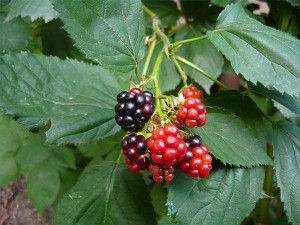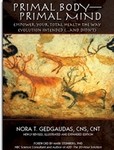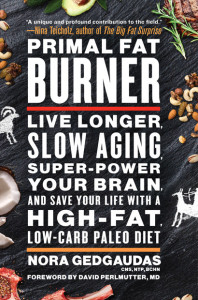
Q: Are all fruits forbidden with this eating plan?
A: Consider that modern day fruit is NOT bred for its nutrient content so much as for its sweetness. Modern cultivated fruit is much larger and far more filled with sugar than its wild counterparts. Wild fruit is far more tart, in general, than sweet and has way more fiber. It was only seasonally available to our ancestors living in more temperate zones.
In other words, it isn’t a food we were designed to eat a whole lot of and modern fruit bears little resemblance to the fruit we evolved eating on occasion. Fruit sugar is also largely fructose, which although less likely to provoke an insulin response is 20-30 times more glycating (damaging to our body) than glucose by itself. If you enjoy eating a few organic berries now and then, so be it. I have no problem with that. I wouldn’t equate fruit with vegetables in terms of their nutrient value and importance, however. Not by a long shot.
~ Nora





What about sufficient, naturally occuring (not supplemented) Vitamin C ?…
Hi Nora,
Thank you for the insightful article on fruit. It’s a pity that it has been changed so much to suit humanity. I’ll look more toward vegetables instead for the most part.
All the best,
Tacy.
Fruit is not the only source of vitamin C though a few berries a day are fine and better than most fruit for vitamin C content. There are plenty of veggies with rich vitamin C content, also. Organ meats (for those inclined to consume them) are another viable source.
Meats contain viable sources of vitamin C if you do not cook your meat. Vitamin C is very heat sensitive.
I wouldn’t worry so much about vitamin c if you are eating enough fresh vegetables. As Gary Taubes pointed out in his book :
“The vitamin-C molecule is similar in configuration to glucose and other sugars in the body. It is shuttled from the bloodstream into the cells by the same insulin-dependent transport system used by glucose. Glucose and vitamin C compete in this cellular-uptake process. Because glucose is greatly favored in the contest, the uptake of vitamin C by cells is globally inhibited when blood sugar levels are elevated. In effect, glucose regulates how much vitamin C is taken up by the cells. Massachusetts nutritionist John Campbell explains that if we increase blood sugar levels, the cellular uptake of vitamin C will drop accordingly. Glucose also impairs the re-absorption of vitamin C by the kidney so the higher the blood sugar, the more vitamin C will be lost in the urine. ”
not to mention a increased load of free radicals that vitamin c would have to quench. it is probably true that the approach outlined in Nora’s book effectively decreases the need and increases the absorption of vitamin c per the alpha lipoic acid in meat that would help recycle vitamin C.
Hi Nora!
Been doing the paleo low carb high fat diet for a while, but getting calf cramps that wake me up at night. really appreciate any advice.
Yours sincerely
Eric from Sweden
Calf/muscle cramps can be due to many different factors, including dehydration, magnesium deficiency, calcium deficiency, potassium (and/or other electrolyte) deficiency, and undiagnosed thyroid disorders. The most common of these, of course, is dehydration. You might also try a small pinch of either Celtic or Himalayan sea salt in a glass of water when hydrating for the electrolyte piece. I hope this helps!
With respect, It isn’t true that modern fruits are significantly sweeter than wild fruits.
Blackberries, salmon berries, thimble berries? (Going by my local environment.)
Yes, they’re SMALLER — but less sweet than, say, an apple?
Not true.
Here are 2 studies that show the opposite:
http://donmatesz.blogspot.com/2010/03/paleo-basics-how-much-sugar-in-wild.html
I’d like you to point to a study where modern fruit is sweeter than natural fruit.
2 comparisons, not 2 studies.
Anyway, the point being I’ve tasted many varieties of both wild and cultivated fruits — as a teenager lived of the land alone for 3 months using a food guide of what the BC coastal natives ate.
And I remember some delicious sweet fruit. Lots of it at times too, since the natives would of course gorge on it in season when they came across a source (and/or mix it with other items to create pemmican, etc.). After all — they have to eat it before the bears do!
I’ve eaten many store bought fruit that while good, were nowhere near as sweet.
You are, of course, correct. Although many wild fruits are less sweet than cultivated varieties this is not always true and berries are certainly a very notable exception. The fact that they are smaller, however, and have to be plucked individually off the bush makes them harder to overconsume (not impossible–harder). I have seen studies pointing to their greater nutrient density in the wild, also. Wild fruit is only seasonally available, of course, so their glycemic influence is limited to only certain times of the year in the wild, as opposed to year-round today in grocery stores. It is also true that modern day fruit tends to be bred to be larger, thereby imparting a much greater individual glycemic load, overall. In general, there isn’t much question that people are getting a lot more sugar from the fruit they eat today (when you add up modern vs primitive fruit consumption) and that people are eating much more of it than our ancestors in most areas of the world ever would have. You are right about it not necessarily being sweeter today. Thanks for your clarifying comments, Christoph.
Nora, I have read your book Primal Body, Primal Mind and have been following the ideas in it and have been receiving a lot of benefit from doing so. But on the subject of wild fruits such as berries I have had a realization which I would like to share. Since fructose does not get metabolized by the brain to let the body know you have had enough to eat, then animals such as bears just keep eating it because it tastes so good. And since many berries ripen close to winter the result is that the fructose is turned to fat in time for winter hardships. This hypothesis extends to humans who also had hard winters, and it says that it’s not a bad thing when done in the context of the growing season just before winter sets in in northern climates.
A hypothesis is that the sudden large intake of fructose when wild fruit is in season may prepare animals, including humans, to store fat for winter.
I feel a bit a fool since I didn’t read the comment before mine which made the same point!
I brought it up today because I had a similar conversation elsewhere and remembered this prior thread.
Carry on.